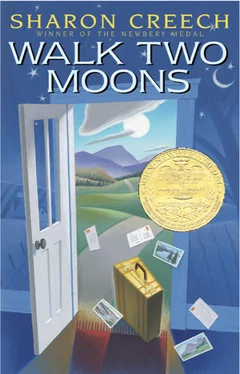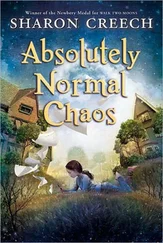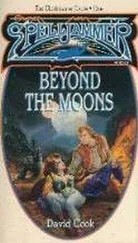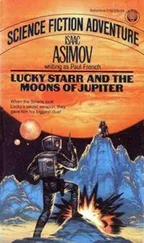In the car, as we started our long journey to Lewiston, Idaho, my grandmother Hiddle said, “Salamanca, why don’t you entertain us?”
“What sort of thing did you have in mind?”
Gramps said, “How about a story? Spin us a yarn.”
I certainly do know heaps of stories, but I learned most of them from Gramps. Gram suggested I tell one about my mother. That I could not do. I had just reached the point where I could stop thinking about her every minute of every day.
Gramps said, “Well then, what about your friends? You got any tales to tell about them?”
Instantly, Phoebe Winterbottom came to mind. There was certainly a hog’s belly full of things to tell about her. “I could tell you an extensively strange story,” I warned.
“Oh, good!” Gram said. “Delicious!”
And that is how I happened to suspend my tree prayers and tell them about Phoebe Winterbottom, her disappearing mother, and the lunatic.
Because I first saw Phoebe on the day my father and I moved to Euclid, I began my story of Phoebe with the visit to the red-headed Margaret Cadaver’s, where I also met Mrs. Partridge, her elderly mother. Margaret nearly fell over herself being nice to me. “What lovely hair,” she said, and “Aren’t you sweet!” I was not sweet that day. I was being particularly ornery. I wouldn’t sit down and I wouldn’t look at Margaret.
As we were leaving, Margaret whispered to my father, “John, have you told her yet—how we met?”
My father looked uncomfortable. “No,” he said. “I tried—but she doesn’t want to know.”
Now that was the truth, absolutely. Who cares? I thought. Who cares how he met Margaret Cadaver?
When at last we left Mrs. Cadaver and Mrs. Partridge, we drove for approximately three minutes. Two blocks from Margaret Cadaver’s was the place where my father and I were now going to live.
Tiny, squirt trees. Little birdhouses in a row—and one of those birdhouses was ours. No swimming hole, no barn, no cows, no chickens, no pigs. Instead, a little white house with a miniature patch of green grass in front of it. It wasn’t enough grass to keep a cow alive for five minutes.
“Let’s take a tour,” my father said, rather too heartily.
We walked through the tiny living room into the miniature kitchen and upstairs into my father’s pint-sized bedroom and on into my pocket-sized bedroom and into the wee bathroom. I looked out the upstairs window down into the backyard. Half of the tiny yard was a cement patio and the other half was another patch of grass that our imaginary cow would devour in two bites. There was a tall wooden fence all around the yard, and to the left and right of our yard were other, identical fenced plots.
After the moving van arrived and two men crammed our Bybanks furniture into our bird-house, my father and I inched into the living room, crawling over sofas and chairs and tables and boxes, boxes, boxes. “Mm,” my father said. “It looks as if we tried to squeeze all the animals into the chicken coop.”
Three days later, I started school and saw Phoebe again. She was in my class. Most of the kids in my new school spoke in quick, sharp bursts and dressed in stiff, new clothes and wore braces on their teeth. Most girls wore their hair in exactly the same way: in a shoulder-length “bob” (that’s what they called it) with long bangs that they repeatedly shook out of their eyes. We once had a horse who did that.
Everybody kept touching my hair. “Don’t you ever cut it?” they said. “Can you sit on it? How do you wash it? Is it naturally black like that? Do you use conditioner?” I couldn’t tell if they liked my hair or if they thought I looked like a whang-doodle.
One girl, Mary Lou Finney, said the most peculiar things, like out of the blue she would say, “Omnipotent!” or “Beef brain!” I couldn’t make any sense of it. There were Megan and Christy, who jumped up and down like parched peas, moody Beth Ann, and pink-cheeked Alex. There was Ben, who drew cartoons all day long, and a peculiar English teacher named Mr. Birkway.
And then there was Phoebe Winterbottom. Ben called her “Free Bee Ice Bottom” and drew a picture of a bumblebee with an ice cube on its bottom. Phoebe tore it up.
Phoebe was a quiet girl who stayed mostly by herself. She had a pleasant round face and huge, enormous sky-blue eyes. Around this pleasant round face, her hair—as yellow as a crow’s foot—curled in short ringlets.
During that first week, when my father and I were at Margaret’s (we ate dinner there three times that week), I saw Phoebe’s face twice more at her window. Once I waved at her, but she didn’t seem to notice, and at school she never mentioned that she had seen me.
Then one day at lunch, she slid into the seat next to me and said, “Sal, you’re so courageous. You’re ever so brave.”
To tell you the truth, I was surprised. You could have knocked me over with a chicken feather. “Me? I’m not brave,” I said.
“You are. You are brave.”
I was not. I, Salamanca Tree Hiddle, was afraid of lots and lots of things. For example, I was terrified of car accidents, death, cancer, brain tumors, nuclear war, pregnant women, loud noises, strict teachers, elevators, and scads of other things. But I was not afraid of spiders, snakes, and wasps. Phoebe, and nearly everyone else in my new class, did not have much fondness for these creatures.
But on that day, when a dignified black spider was investigating my desk, I cupped my hands around it, carried it to the open window, and set it outside on the ledge. Mary Lou Finney said, “Alpha and Omega, will you look at that!” Beth Ann was as white as milk. All around the room, people were acting as if I had singlehandedly taken on a fire-breathing dragon.
What I have since realized is that if people expect you to be brave, sometimes you pretend that you are, even when you are frightened down to your very bones. But this was later, during the whole thing with Phoebe’s lunatic, that I realized this.
At this point in my story, Gram interrupted me to say, “Why, Salamanca, of course you’re brave. All the Hiddles are brave. It’s a family trait. Look at your daddy—your momma—”
“Momma’s not a real Hiddle,” I said.
“She practically is,” Gram said. “You can’t be married to a Hiddle that long and not become a Hiddle.”
That is not what my mother used to say. She would tell my father, “You Hiddles are a mystery to me. I’ll never be a true Hiddle.” She did not say this proudly. She said it as if she were sorry about it, as if it were some sort of failing in her.
My mother’s parents—my other set of grandparents—are Pickfords, and they are as unlike my grandparents Hiddle as a donkey is unlike a pickle. Grandmother and Grandfather Pickford stand straight up, as if sturdy, steel poles ran down their backs. They wear starched, ironed clothing, and when they are shocked or surprised (which is often), they say, “Really? Is that so?” and their eyes open wide and their mouths turn down at the corners.
Once I asked my mother why Grandmother and Grandfather Pickford never laughed. My mother said, “They’re just so busy being respectable. It takes a lot of concentration to be that respectable.” And then my mother laughed and laughed, in a gentle way, and you could tell her own spine was not made of steel because she bent in half, laughing and laughing.
My mother said that Grandmother Pickford’s one act of defiance in her whole life as a Pickford was in naming her. Grandmother Pickford, whose own name is Gayfeather, named my mother Chanhassen. It’s an Indian name, meaning “tree sweet juice,” or—in other words—maple sugar. Only Grandmother Pickford ever called my mother by her Indian name, though. Everyone else called my mother Sugar.
Читать дальше












